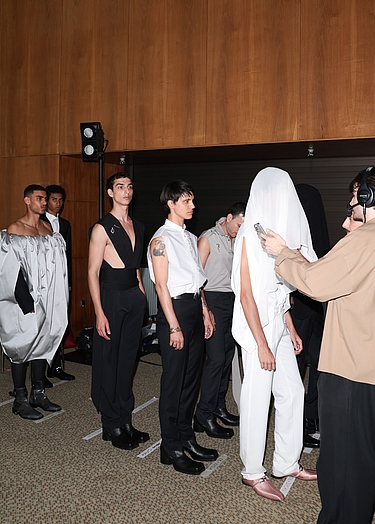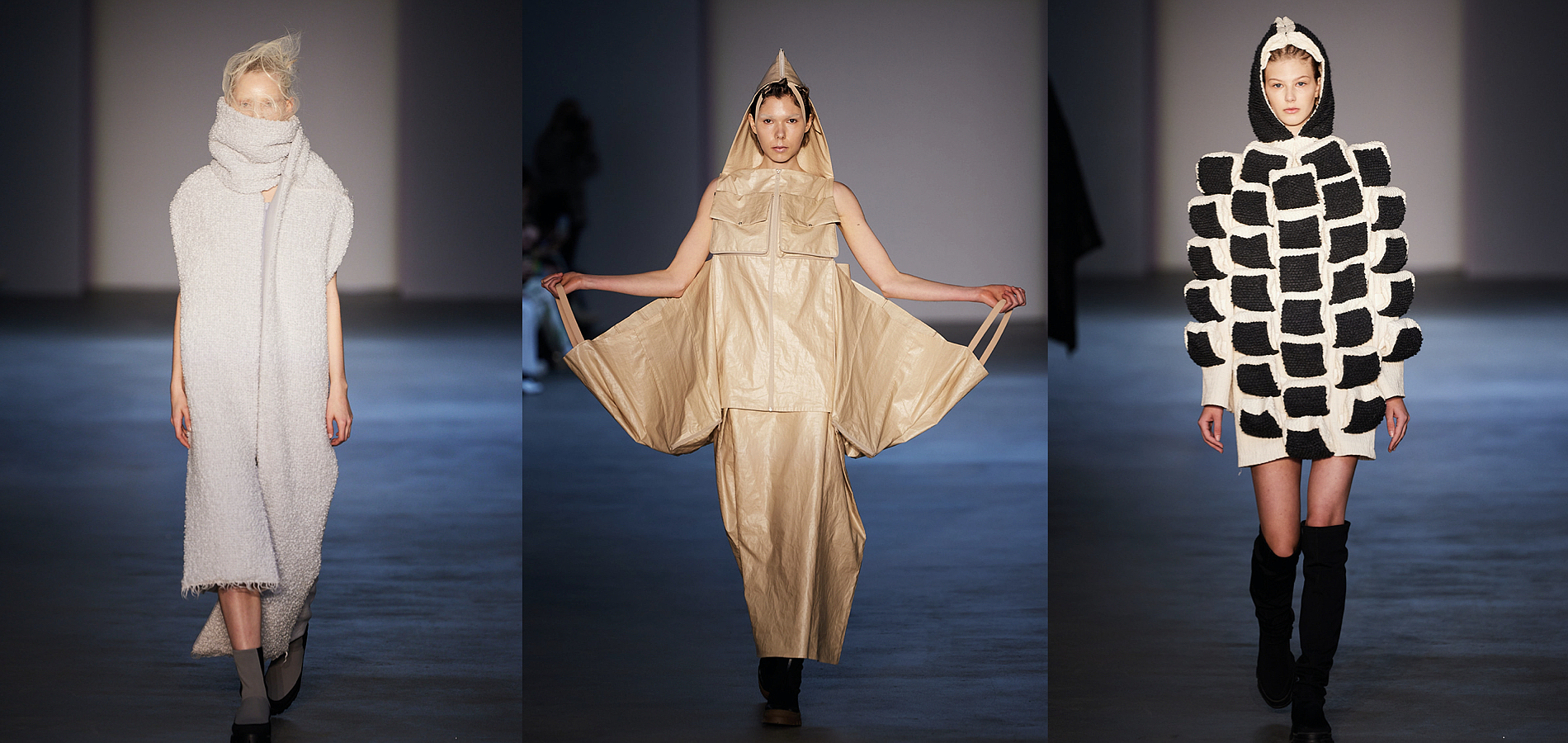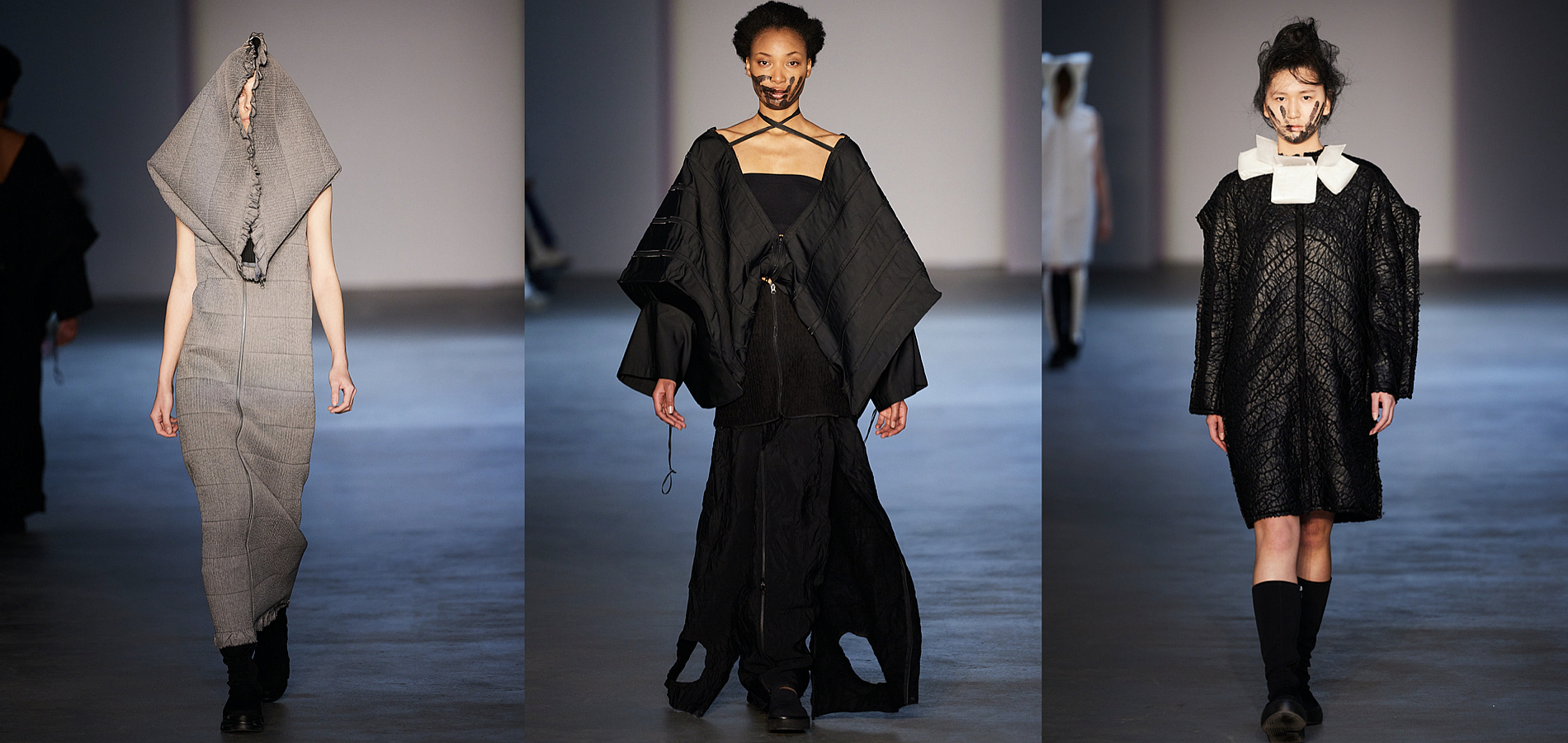
News

Hello Irina, thank you for taking the time out of your busy day for our interview today. Firstly, I would kindly ask you to introduce yourself and your label?
I am Irina Dzhus, the designer behind a Ukrainian conceptual brand DZHUS.
What are 3 words you yourself would use to describe your designs?
Innovative, nonconformist, ethical.
Why did you decide to design fashion which can be transformed? What is the biggest challenge you encounter when designing these transformation pieces?
In my opinion, multipurpose outfits are an alternative solution for a sustainable wardrobe. Even one transformer garment can provide its wearer with a spectrum of styling options, whereas a small capsule of multifunctional items offers an endless variety of wearable combinations. Such smart approach to consumption limits physical shopping along with opening impressive opportunities for everyday creativity. The biggest challenge, when it comes to transformer clothing and accessories, is the multiplied complexity of the design process, due to which it’s extremely time-consuming, and there is very little at the development stage that can be delegated. In the event, in almost 13 years since DZHUS’ launch, I’m still fully involved in all the processes and remain the only person responsible for most of the creative direction and the entire design in particular. Such approach results in exhaustion of my mental and physical sources and absence of free time, which is, altogether, harmful enough for me as an individual.

You also attach importance to unisex designs and ethical materials. Please tell us more about it.
Although my designs are initially inspired by female physique and I’ve been basing DZHUS’ most tailored pieces on women’s pattern-making systems, I find it highly relevant to keep unisex fit for many of our products. Gender inclusivity is a crucial element of our identity, especially taking into account that more and more male and nonbinary customers rely on DZHUS in their self-expression, which I’m quite excited about.
Speaking of animal-friendly materials, DZHUS has been a cruelty-free brand from the very day of its launch in 2010, which has nothing to do with concepts or trends. As a vegetarian for ethical reasons, I find it an a-priori moral norm to boycott any forms of violence in all kinds of human activity. And when it comes to creativity, fashion is such a powerful tool to communicate the ideology of conscious approach in an attractive and utilitarian way.
As a creative, you probably deal with many current issues and are always evolving. Has Berlin inspired new creative directions for your designs?
I’m pretty sure Berlin has something to offer to everyone. This city has brought me some life-changing experiences, enriching my mindset and questioning fundamental matters of my existence. My design has always been extremely personal, as through it I’ve been translating themes that resonate with my state of mind most, and my sources of inspiration are thoroughly filtered through the prism of my peculiar perception of the reality. Naturally, my artistic language and concepts as such transform simultaneously with the evolution of my personality. In this regard, I can say that Berlin has had a significant impact on my work.
What do you think are the biggest chances and challenges your label will face in the future?
It’s no secret that truly conceptual fashion is neither fast nor very profitable. Thus, speaking of challenges, along with the brand’s development, it’s getting more and more difficult to fit in the required timelines as well as fulfil the financial needs of the proper promotion – which is ironic enough, as, according to logic, the algorithm should be the opposite. Unfortunately, so far, ‘slow fashion’ is a mere Utopia.
At the same time, as a Ukrainian brand, DZHUS has received enormous support from the international fashion community since the war started. The numerous opportunities varied from charity pop-ups, complimentary services, educational programmes, free-of-charge participation in contests, grants for the business and, most importantly, showcases at the most influential fashion events, such as Berlin Fashion Week. This has become a beginning to a powerful synthesis of the international industry and the most distinctive representatives of Ukrainian design. On behalf of DZHUS, I am honoured to represent Ukraine on the global scale and hope to continue our intense integration.

What do you think how the fashion industry in general will change in the future?
I believe that the future of fashion is much more about technology than trends, and such alternative solutions as multipurpose clothing can pave the way to a completely different approach to fashion.
What importance has the Berlin Fashion Week for your Label?
Berlin Fashion Week is an extremely impactful platform for independent brands like DZHUS, providing opportunities for gaining international recognition and resulting in impressive press coverage and unique networking. For us, it has become a starting point for interesting collaborations and new marketing solutions.
I would love to know what your outlook is on fashion in 2023. Which emerging trends are you most focused on?
As a Fashion Design teacher at Warsaw Fine Arts Academy, I’m currently focused on talents developing under my supervision. Although it’s getting harder and harder to contribute something completely new in the industry, I sometimes have a chance to discover brilliant ideas and help develop those. Simultaneously, I learn so much from the next generation when it comes to ethics and worldview.
Thanks for the interview!